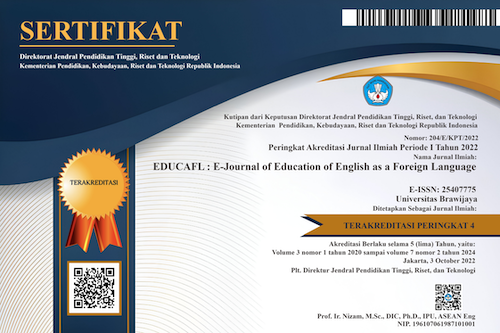LEXICAL RICHNESS OF THE TEACHING ENGLISH IN EXPOSITORY WRITING IN INDONESIAN SENIOR HIGH SCHOOL STUDENTS
DOI:
https://doi.org/10.21776/ub.Educafl.2018.001.02.01Keywords:
Language, Lexical Richness, English Language Teaching (ELT)Abstract
This study investigates the lexical richness in senior high school students. The data are taken from the students’ writing on expository essays. Writing an expository essay is a challenge for students where they should be able to write based on a given theme using a varied vocabulary so later the students are capable making a good writing. The students are collected from three grades that consist of 30 students in each grades from grade 10 to 12. By the total amount of 90 students, it will be measured by some types of lexical richness; lexical density, lexical sophistication, and lexical variation. After being investigated, the results found that lexical richness in each grades showed a significant increase in each class, starting from grade 10 to grade 12. According to all those three measurements, showed that grade 12 is the highest percentages among others and it concludes that students in grade 12 is the most prepared and have the richest lexical between grade 10 and 11.References
Bestgen, Y. (2017). Beyond single-word measures: L2 writing assessment, lexical richness and formulaic competence. An International Journal of Educational Technology and Applied Linguistics.
Caselli, N., Caselli, M., & Goldberg, A. (2016). Inflected words in production: Evidence for a morphologically rich lexicon. Quartely Journal of Experimental Psychology, 69(3), 432–454.
Cummins, S., & Quiroa, R. . (2012). Teaching writing expository responses to narrative texts. The Reading Teacher, 66(6), 381–386.
Daller, J. T.-. (2010). Operationalizing and measuring language dominance. International Journal of Bilingualism, 15(2), 147–163.
Djiwandono, P. (2016). Lexical Richness In Academic Papers: A Comparison Between Students’ And Lecturers’ Essays. Journal of Applied Linguistics, 5(2).
Gharibi, K., & Boers, F. (2017). Influential factors in lexical richness of young heritage speakers’ family language: Iranians in New Zealand. International Journal of Bilingualism.
Gregori-Signes, C., & Clavel-Arroitia, B. (2015). Analysing Lexical Density and Lexical Diversity in University Students’ Written Discourse. 7th International Conference on Corpus Linguistics, 198(Cilc), 546–556. https://doi.org/10.1016/j.sbspro.2015.07.477
Hanafiah, R., & Yusuf, M. (2016). Lexical Density And Grammatical Intricacy In Linguistic Thesis Abstract: A Qualitative Content Analysis. Consortium of Asia Pacific.
Koizumi, R., & In’nami, Y. (2012). Effects of text length on lexical diversity measures: Using short texts with less than 200 tokens. System, 40(4), 522–532. https://doi.org/10.1016/j.system.2012.10.017
Kyle, K., & Crossley, S. (2016). The relationship between lexical sophistication and independent and source-based writing. Journal of Second Language Writing, 34, 12–24. https://doi.org/10.1016/j.jslw.2016.10.003
Laufer, B., & Nation, P. (1995). Vocabulary Size and Use: Lexical Richness in L2 Written Production. Oxford University Press.
Lu, X. (2012). The relationship of lexical richness to the quality of ESL learners’ oral narratives. The Modern Language Journal, 96(2), 190–208.
Lu, X., & Ai, H. (2015). Syntactic complexity in college-level English writing: Differences among writers with diverse L1 backgrounds. Journal of Second Language Writing, 29, 16–27. https://doi.org/10.1016/j.jslw.2015.06.003
Manik, S., & Simurat, J. D. (2015). Improve Students’ Narrative Writing Achievement Through Film at SMA NEGERI I PALIPI. International Journal of English Linguistics, 5(2).
Pritomo. (2012). Lexical Richness in Teacher Talk of a Non Native English Teacher in the Foreign Language Classroom. Universitas Negeri Malang.
Schmitt, N., & Schmitt, D. (2013). A reassessment of frequency and vocabulary size in L2 vocabulary teaching. Language Teaching.
Suggate, S., & Stoeger, H. (2017). Fine Motor Skills Enhance Lexical Processing of Embodied Vocabulary: A Test of the Nimble-Hands, Nimble-Minds Hypothesis. Quartely Journal of Experimental Psychology, 70(1), 2169–2187.
Tantra, D. (2015). Teaching English As A Foreign Language In Indonesia: A Literature Review. Lingual: Journal of Language and Culture, 4(1), 1–5. Retrieved from https://ojs.unud.ac.id/index.php/languange/article/view/19259
White, R. (2014). Lexical Richness In Adolescent Writing, Insights From The Classroom: An L1 Vocabulary Development Study. Victoria University of Wellington.
Downloads
Published
Issue
Section
License
Authors who publish with this journal agree to the following terms:
- Authors retain copyright and grant the journal right of first publication with the work simultaneously licensed under a Creative Commons Attribution License that allows others to share the work with an acknowledgement of the work's authorship and initial publication in this journal.
- Authors are able to enter into separate, additional contractual arrangements for the non-exclusive distribution of the journal's published version of the work (e.g., post it to an institutional repository or publish it in a book), with an acknowledgement of its initial publication in this journal.
- Authors are permitted and encouraged to post their work online (e.g., in institutional repositories or on their website) prior to and during the submission process, as it can lead to productive exchanges, as well as earlier and greater citation of published work (See The Effect of Open Access).



